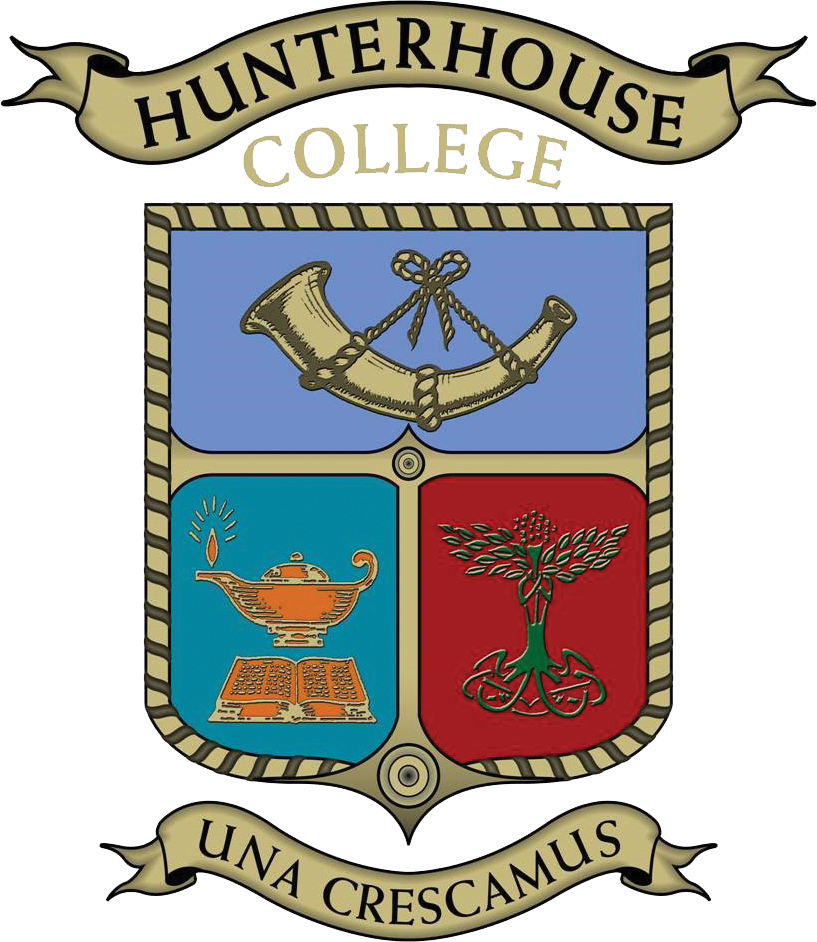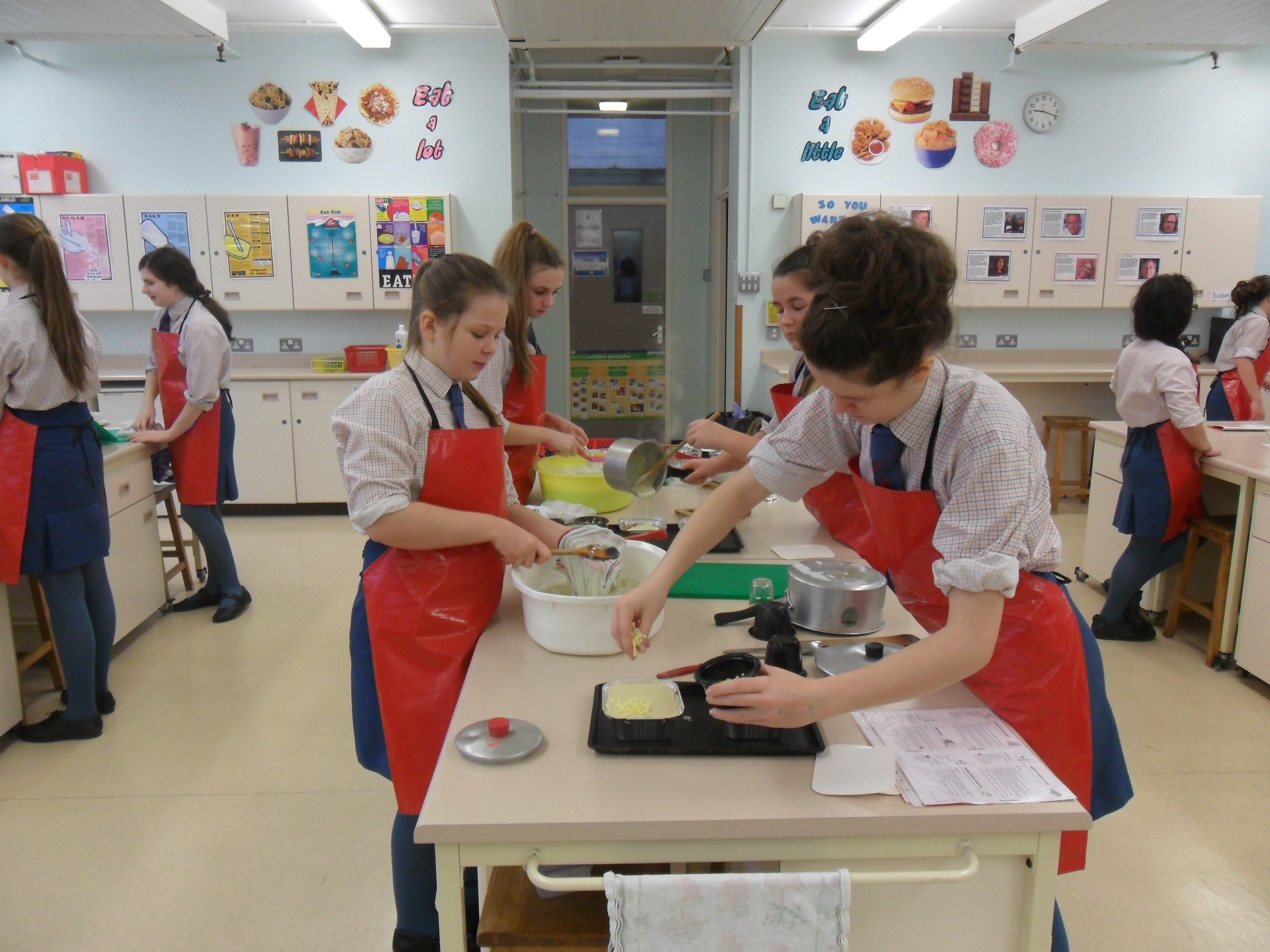Home Economics
Home Economics is a fun, interactive and relevant subject which is studied by all KS3 students. Theory and practical lessons provide students with the opportunity to develop many lifelong skills. Students also have the opportunity to continue studying Home Economics at GCSE (Food and nutrition) and A Level (Nutrition and Food Science).
Home Economics at Key Stage 3
Home Economics combines aspects of science, nutrition, cooking, and finance. Students learn about the inter-relationships between diet, health, family, home and choice and the management of resources. Home Economics develops students as individuals by helping them explore their health in a practical context, enhancing their potential to live a healthy lifestyle and make responsible choices about their diet and food.
The Key Stage 3 content concentrates on the main areas of:
- Healthy Eating
- Home and Family Life
- Independent Living
GCSE Food and Nutrition (CCEA)
Food and Nutrition encourages students to develop knowledge and understanding of the science behind food.
They also gain knowledge, understanding and skills in areas such as:
- food provenance
- food processing and production
- macronutrients
- micronutrients
- government nutritional guidelines
- food safety.
- health issues associated with dietary and lifestyle choices
- the factors affecting how we buy food, what we buy and what we waste
- planning meals for people with specific nutritional and dietary needs
Students also develop practical skills in food preparation, cooking and presentation.
The specification has two components:
- Component 1: Food and Nutrition (Written examination)
- Component 2: Practical Food and Nutrition. (Controlled Assessment)
With this qualification, students may choose to progress to our GCE in Nutrition and Food Science or other related courses. This course also provides an excellent foundation for a career in food-related industries.
A-level Nutrition and Food Science
There are four assessed modules: three externally assessed through written examinations and one internal Controlled Assessment module. The specification allows students to develop their subject knowledge, understanding and skills in nutrition and food science in relation to a work context.
Specification Overview
AS 1: Principles of Nutrition (External exam) – Study of macronutrients and micronutrients and other dietary constituents and well as the nutritional requirements and dietary recommendations across the lifespan.
AS 2: Diet, Lifestyle and Health (External exam) – Study of the current research in relation to diet, lifestyle and health.
A2 1 Food Safety and Quality (External exam) – Study of securing a safe food supply from primary producer to consumer.
A2 2: Research Project – Internal assessment (4000 words) -Through this research project, students develop advanced study skills to help prepare them for higher education and the world of work. Students have the opportunity to develop a wide range of transferable skills and capabilities such as critical and creative thinking, decision-making, problem-solving, conducting primary research and target-setting.
Career Opportunities after studying Home Economics:
- Food Scientist/Technologist
- Dietetics and Nutrition
- Agri-Food Industry
- Hospitality and Tourism
- Hotel and Restaurant Management
- New Product Development
- Research and Development
- Environmental health
- Human Resource Management
- Money Management
- Consumer Advice for example Citizens Advice
- Government health departments
- Health Promotion for example Cancer Focus NI
- Education – teacher of Home Economics, lecturer in nutrition
Trips, Visits & Speakers
We regularly have the Livestock and Meat Commission into our Year 10 classes for cookery demonstrations.
GCSE students visit the CAFRE campus at Loughry each year to learn about food processing techniques and careers in the Agri-food industry.
Senior students are given the opportunity to go to London to learn about food which includes cookery workshops with Waitrose, new product development sessions with Marks and Spencer and learning about new types of food in Borough Market.
Home Economics is a fun, interactive and relevant subject which is studied by all KS3 students. Theory and practical lessons provide students with the opportunity to develop many lifelong skills. Students also have the opportunity to continue studying Home Economics at GCSE (Food and nutrition) and A Level (Nutrition and Food Science).
Home Economics at Key Stage 3
Home Economics combines aspects of science, nutrition, cooking, and finance. Students learn about the inter-relationships between diet, health, family, home and choice and the management of resources. Home Economics develops students as individuals by helping them explore their health in a practical context, enhancing their potential to live a healthy lifestyle and make responsible choices about their diet and food.
The Key Stage 3 content concentrates on the main areas of:
- Healthy Eating
- Home and Family Life
- Independent Living
GCSE Food and Nutrition (CCEA)
Food and Nutrition encourages students to develop knowledge and understanding of the science behind food.
They also gain knowledge, understanding and skills in areas such as:
- food provenance
- food processing and production
- macronutrients
- micronutrients
- government nutritional guidelines
- food safety.
- health issues associated with dietary and lifestyle choices
- the factors affecting how we buy food, what we buy and what we waste
- planning meals for people with specific nutritional and dietary needs
Students also develop practical skills in food preparation, cooking and presentation.
The specification has two components:
- Component 1: Food and Nutrition (Written examination)
- Component 2: Practical Food and Nutrition. (Controlled Assessment)
With this qualification, students may choose to progress to our GCE in Nutrition and Food Science or other related courses. This course also provides an excellent foundation for a career in food-related industries.
A-level Nutrition and Food Science
There are four assessed modules: three externally assessed through written examinations and one internal Controlled Assessment module. The specification allows students to develop their subject knowledge, understanding and skills in nutrition and food science in relation to a work context.
Specification Overview
AS 1: Principles of Nutrition (External exam) – Study of macronutrients and micronutrients and other dietary constituents and well as the nutritional requirements and dietary recommendations across the lifespan.
AS 2: Diet, Lifestyle and Health (External exam) – Study of the current research in relation to diet, lifestyle and health.
A2 1 Food Safety and Quality (External exam) – Study of securing a safe food supply from primary producer to consumer.
A2 2: Research Project – Internal assessment (4000 words) -Through this research project, students develop advanced study skills to help prepare them for higher education and the world of work. Students have the opportunity to develop a wide range of transferable skills and capabilities such as critical and creative thinking, decision-making, problem-solving, conducting primary research and target-setting.
Career Opportunities after studying Home Economics:
- Food Scientist/Technologist
- Dietetics and Nutrition
- Agri-Food Industry
- Hospitality and Tourism
- Hotel and Restaurant Management
- New Product Development
- Research and Development
- Environmental health
- Human Resource Management
- Money Management
- Consumer Advice for example Citizens Advice
- Government health departments
- Health Promotion for example Cancer Focus NI
- Education – teacher of Home Economics, lecturer in nutrition
Trips, Visits & Speakers
We regularly have the Livestock and Meat Commission into our Year 10 classes for cookery demonstrations.
GCSE students visit the CAFRE campus at Loughry each year to learn about food processing techniques and careers in the Agri-food industry.
Senior students are given the opportunity to go to London to learn about food which includes cookery workshops with Waitrose, new product development sessions with Marks and Spencer and learning about new types of food in Borough Market.




